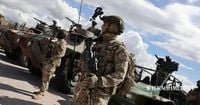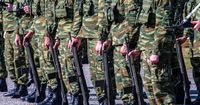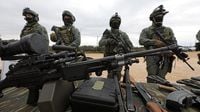Prime Minister Kyriakos Mitsotakis is currently in Paris, attending a summit focused on Peace and Security in Ukraine, initiated by French President Emmanuel Macron. This meeting includes notable leaders such as Antonio Costa, Ursula von der Leyen, and Mark Rutte, and serves as a crucial platform for Greece to reiterate its terms for participation in any international efforts regarding the ongoing conflict.
As reported by the newspaper Kathimerini, Mitsotakis's presence at this summit is not merely ceremonial; it is a strategic opportunity for Greece to voice its conditions for involvement in Ukraine. Central to these conditions is the insistence that Greece will only participate in any international force following the establishment of a ceasefire agreement in Ukraine. This stipulation underscores Greece's cautious approach to military involvement in a conflict that remains highly volatile.
Moreover, Mitsotakis has made it clear that Greek forces will not engage in any operations within Russian territory. Should there be any breach of the ceasefire agreement by Moscow, Greek troops are expected to return to Greece immediately. This position reflects Athens' commitment to safeguarding its military personnel while navigating the complexities of international alliances.
Interestingly, the prospect of deploying Greek forces under the auspices of the European Union has largely been dismissed due to Russia's objections and the stance of certain EU member states, such as Hungary. Instead, Greece views the potential deployment of forces under the United Nations as a more viable solution. This approach would allow for a more inclusive international effort, potentially drawing contributions from countries outside the so-called "Alliance of the Willing," including nations from Africa, Latin America, and Asia.
In light of these developments, it remains uncertain what specific forces Greece might contribute if an agreement is reached. The discussion includes the possibility of sending troops to Ukraine or participating in maritime operations in the Black Sea. Athens seems to favor involvement in naval operations, given the nature of the mission. However, the feasibility of this option is still unclear, particularly if Turkey's proposal to lead the maritime patrol force is accepted.
Sources indicate that Turkey has cited the provisions of the Montreux Convention regarding the status of the Straits, which allows full access to the Black Sea only for coastal states, while others face time restrictions. Turkey has suggested taking command of the maritime force in collaboration with Bulgaria and Romania.
The careful management of this situation by Athens is vital for two main reasons: first, to ensure Greece's presence in the evolving landscape of the conflict, and second, to do so in a manner that secures national interests and the safety of Greek soldiers who may be deployed.
Another critical aspect of this mission is its nature. Since Ukraine is not a NATO member, any potential incident or escalation of hostilities that results in injury or loss of life among third-country soldiers in areas where peacekeeping forces are deployed would not be covered by any collective defense provisions. This reality necessitates a thorough discussion with Russian or Ukrainian authorities should such situations arise.
Consequently, the geographical area where Greek forces might be deployed is of utmost importance. For example, the situation along the front lines between Russian and Ukrainian forces in eastern Ukraine would differ significantly from that in areas surrounding Kyiv, Lviv, or the port of Odessa.
As Greece seeks to participate in the unfolding developments, even at a different pace, it has already begun planning for its involvement in the mission at the brigade level, as noted last week.
Mitsotakis's participation in this summit is a clear indication of Greece's commitment to addressing the security situation in Ukraine. By setting these conditions, Greece aims to align itself with broader European efforts while ensuring the safety of its military personnel and the protection of its national interests.








